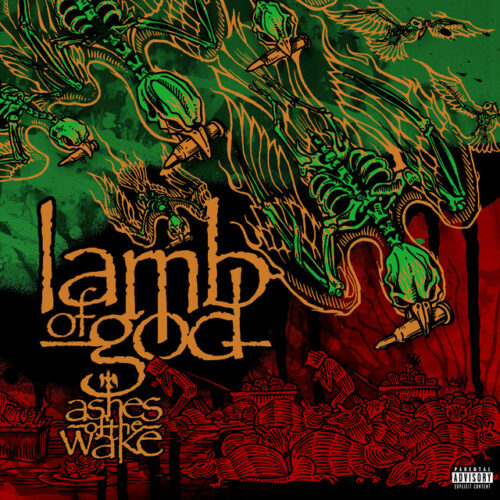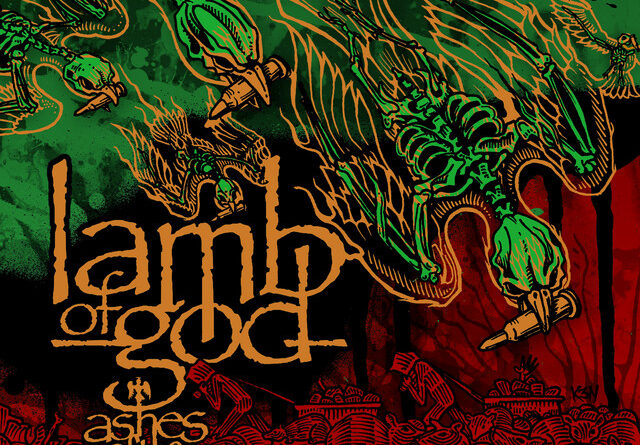HEAVY MUSIC HISTORY: Ashes Of The Wake – Lamb Of God
The time between LAMB OF GOD’s third and fourth albums was a little under sixteen months, yet what happened in that period was the rise of one of the most prominent bands in a movement fast being dubbed as ‘The New Wave of American Heavy Metal’. 2003 record As The Palaces Burn ended the year atop both Revolver and Metal Hammer’s Album of the Year charts, while the band undertook tours in both the UK and North America, opening for ANTHRAX and taking part in the inaugural Headbangers Ball tour alongside KILLSWITCH ENGAGE, SHADOWS FALL and GOD FORBID.
Crucially as well, it drew the attention of major label Epic, who signed the band from Prosthetic and wanted an album right away, leaving the band little time to regroup. “We had to respond quickly, there was no other way” guitarist Mark Morton told Loudwire back in 2004. “We were under a lot of pressure – we hadn’t really finished touring the last record and before we knew it, we were back in the studio writing songs again.”
Drums were tracked at Water Music Studios in Hoboken, NJ, with guitars and vocals recorded at Sound Of Music in their hometown of Richmond, VA. At the production helm was Gene Freeman, more famously known as Machine and a man who, by then, had worked with likes of CLUTCH, VISIONS OF DISORDER and PITCHSHIFTER, including the latter’s 1998 breakthrough www.pitchshifter.com; he didn’t give them an easy ride either. “I’m glad working with [him] wasn’t stress free,” Morton would reveal. “I want the guy I’m working with to care and disagree with me, and fight for what he thinks is right.”
Going into the record, the band were keen to distance themselves from the burgeoning metalcore scene that critics tried to pigeonhole them into; in fact, if you find videos of LAMB OF GOD from the early 00’s, you’ll often see people in the pit two-stepping and throwing hardcore arms. They took their existing sound, infused it with melodic death metal and thrash and released Ashes Of The Wake twenty years ago this month, on 31st August 2004. Despite its more extreme elements, it was an immediate hit with not just the band’s fans, but metal fans in general. It would debut at #27 on the Billboard 200 and, two decades later, it remains the band’s best selling album.
Much of the music, especially lyrically, was inspired by the events in the Middle East that had begun in March of 2003 when the USA and UK invaded Iraq on ground of terrorism and building weapons of mass destruction. “I always like to write about whatever I’m thinking about, and at the time I think the war was on pretty much everyone’s mind,” vocalist Randy Blythe said. “Politicians said one thing, but it didn’t take a lot to see that something else entirely was going on, and all these soldiers were being led into a situation they didn’t sign up for.”
Songs like the pummelling Now You’ve Got Something To Die For, The Faded Line and One Gun all took their cue from the conflict, as did the instrumental title track that featured harrowing excerpts from an interview with former Marine Staff Sergeant Jimmy Massey in an interview following his return from the war (the song also featured guitar solos from TESTAMENT’s Alex Skolnick and former MEGADETH axeman Chris Poland). Elsewhere, there was discussions of honour on Omerta – Randy’s opening quote paraphrases the Sicilian Mafia’s code of silence – and opening track Laid to Rest, now one of the group’s most popular and recognisable songs, would instantly usher in the groove metal sound that, for better or worse, saw LAMB OF GOD given the moniker of ‘The New PANTERA’.
Mind you, if then-drummer Chris Adler’s words were anything to go by, the comparison to one of metal’s greatest meant they were going in the right direction. “I think it’s important for us to create a legacy for this band, and I don’t want that legacy to be in association with anyone else” he also told Loudwire in 2004. “In our minds, we’re a cut above the rest of the bands that are out there right now, and we feel like we put a whole lot more into our music than some of the bands we have been compared to.”
As it has transpired, the album would not only help LAMB OF GOD kickstart such a legacy, but continues to help cement it. Tracks from Ashes of the Wake remain constant in their setlists, and the band chose to play the record in full as part of a livestream during the COVID-19 pandemic. Depending on how you view the albums that have come since – and there’s been half a dozen of them – you may not consider Ashes Of The Wake to be LAMB OF GOD’s best album, however it’s virtually undeniable that it’s their most important.

Ashes Of The Wake was originally released on August 31st, 2004 via Epic Records.
Like LAMB OF GOD on Facebook.

